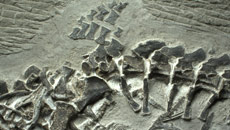The soaring temperature may not determine whether you give birth to a boy or a girl, but whether an insect would have a male or female offspring depends on the temperature.
A species of oophagous parasitoid (Trichogramma euproctidis) deliberately gave birth to more males when the temperature was hot, a new study showed.
“We know that climate affects the reproductive behaviour of insects. But we never clearly demonstrated the effects of climate change on sex allocation in parasitoids,” explained Joffrey Moiroux from the University of Montreal in Canada.
Trichogramma euproctidis lays its eggs inside a host insect that would be consumed by the future larvae.
As in bees, wasps and ants, the gender determination of Trichogramma parasitoids is called “haplodiploid” where fertilised eggs produce female offspring, while unfertilised eggs produce male offspring.
"It is possible to predict whether the parasitoid will lay a son or daughter by observing the presence or absence of a pause in its abdominal contractions at the time of spawning," Moiroux noted.
A pause means the egg will be fertilised. Conversely, the absence of a pause means the egg will not be fertilised, he explained.
To know whether this particular behaviour is modified by climate, the researcher exposed female Trichogramma to three different temperatures: 34 degrees Celsius (high), 24 degrees Celsius (medium), and 14 degrees Celsius (low).
The study found that when it was hot, females deliberately produced more males than at medium temperature - at 34 degrees Celsius, the number of males produced increased by 80 percent.
The ability of Trichogramma to "programme" the sex of their offspring is compromised, however, when the temperature is cold, the researchers noted.
The study appeared in the journal Animal Behaviour.





